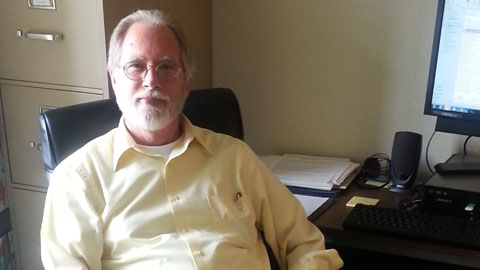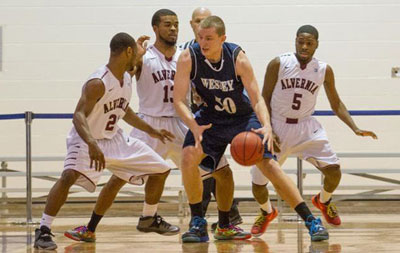By Raiisha Jefferson (Whetstone Staff Writer)
Raiisha Jefferson: Where are you originally from?
Tony Armstrong: My father was in the Air Force. I was born in an Air Force hospital. I grew up in southern Idaho, in a small place called Emmitt.
RJ: What year did you graduate high school?
           TA: I graduated in 1970. I graduated from San Clemente High School in San Clemente, Calif.
RJ: What made you come to Delaware?
           TA: A job offer at Wesley.
RJ: How long have you been working at Wesley?
           TA: I’m starting my 25th year here at Wesley.
RJ: What made you start teaching the Happiness class?
           TA: I wanted to figure people out. My undergraduate degree was in psychology. And I learned they had interesting theories, but I don’t really think there was much insight to be gained. I discovered I found politics and social theories more interesting.
           RJ: Do you think your Happiness class benefits your students?
           TA: I think it makes them more aware of what’s going on inside them. A lot of change from insights about happiness will only come later. I have had some students who have told me it’s a big impact on their life. A number of them have agreed with me happiness should be taught in a number of schools.
           RJ: What made you begin looking into psychology?
           TA: I’ve always been interested in happiness as a core human pursuit. And I asked if happiness is important and if it’s important in schools. And that led to thought and research and eventually writing a book on teaching happiness in schools. I had an awakening in the Nineties, which led to my first book called the Love Star.
           RJ: What is your ultimate goal in teaching your class?
           TA: Ultimate happiness. Practically speaking, eventually I want to be involved in promoting happiness education.
RJ: Were there any people who inspired you to pursue psychology?
TA: I think I always wanted to do that as a kid.
RJ: What are your plans for the future at Wesley?
TA: I would like to continue teaching the Happiness class and I’d like to perhaps expand it.
RJ: How would you like to expand the course on Happiness?
           TA: I would like to teach more sections or have related courses to Happiness such as other Humanities classes. A long time ago, there was a course on Happiness in psychology. My course is in psychology, philosophy and politics.
RJ: What kind of topics would you teach if you expanded your course?
           TA: There would be topics related to the pursuit of happiness. For example, I thought of teaching a course on love. Or a course on mental practices related to happiness. I also wrote a book on the philosophy of love.
RJ: What are your thoughts on the school? Does it affect what you talk about in your classes?
           TA: They hired me to teach political science. Whether I like it or not, that’s what I have to teach. I haven’t been able to convince anyone to teach that happiness is important.
RJ: Are you a part of the political science department?
           TA: For the longest time, I was the political science department. The new core allows interdisciplinary courses and the Happiness class is listed under humanities.



